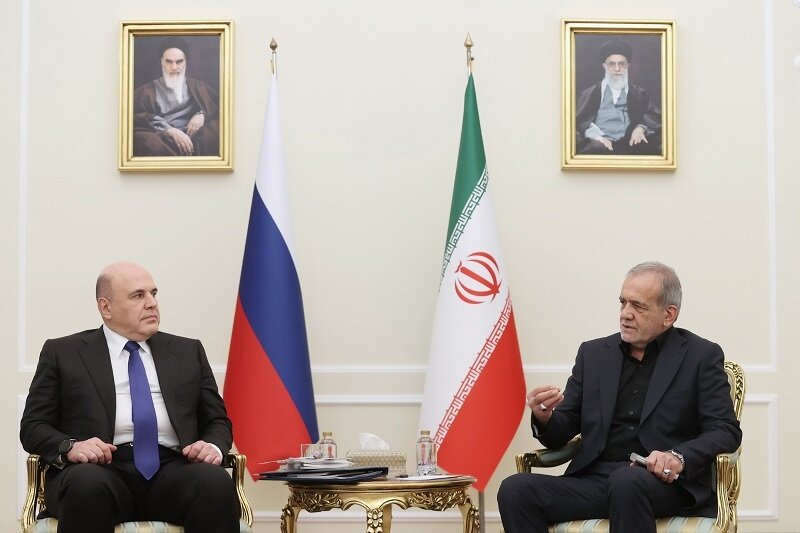Tehran, Moscow on path to strengthen ties as Iranian President receives Russian PM

TEHRAN -Mikhail Mishustin, the Prime Minister of Russia, has emphasized the importance of strengthening relations between Moscow and Tehran, particularly highlighting the efforts to enhance trade and economic cooperation in key sectors such as transportation, energy, industry, and agriculture.
Mishustin arrived in Tehran at the head of a high-level political and economic delegation.
His meeting with Iranian President Masoud Pezeshkian on Monday, marked an important step in advancing bilateral relations and addressing key regional challenges.
During their discussions, President Pezeshkian highlighted the recently signed agreement to transform Iran into a regional transit and gas hub. He characterized this initiative as a prime example of the collaborative spirit between Iran and Russia, aimed at securing mutual interests and promoting sustainable development. The President asserted that the successful implementation of substantial joint projects could significantly enhance both nations' abilities to counteract unfair sanctions imposed by external powers.
The exchange of diplomatic delegations between the two nations was also emphasized as a means to strengthen interactions and expedite the implementation of existing agreements. Pezeshkian pointed out that these collaborative efforts are crucial not only for bilateral cooperation but also for fostering broader regional integration and economic growth.
Mishustin expressed his satisfaction with the warm reception and conveyed greetings from Russian President Vladimir Putin. He reaffirmed Russia's commitment to enhancing ties with Iran, particularly in key sectors such as energy, transportation, agriculture, and healthcare. The Prime Minister noted that while recent months have seen a notable increase in trade exchanges, there remain significant untapped opportunities for both countries.
The Russian official also underscored the necessity of deepening cooperation to establish a new world order that benefits all nations. He encouraged Iran and Russia to work closely together in light of escalating regional tensions, which he attributed to U.S. policies that aim to exacerbate conflicts for its own interests.
In a related development, First Vice President Mohammad-Reza Aref underscored the Iranian government's commitment to strengthening ties with Moscow. He condemned recent actions by the Israeli regime in Gaza and Lebanon and praised Russia's constructive role in international forums, particularly the United Nations Security Council, where its influence could help mitigate violence against innocent civilians.
Aref reiterated the importance of swiftly operationalizing signed memorandums of cooperation and enhancing collaboration in all sectors to better resist sanctions from the U.S. and its allies. He emphasized the need for a robust dialogue on critical regional issues, such as the Zangezur corridor and the North-South corridor, cautioning that any shifts in regional geopolitics could lead to tensions exploited by outside actors.
The First Vice President also highlighted ongoing infrastructure projects, including the completion of the Sirik power plant and the Bushehr nuclear power plant's second and third units, underlining the significance of a $1.2 billion financing agreement for these endeavors. He called for increased multilateral cooperation with countries like China and participation in regional organizations to bolster both Iranian and Russian interests.
With current trade volumes between Iran and Russia reaching $2.5 billion, Aref expressed optimism that further efforts could elevate this figure to reflect the potential both countries possess. He reiterated that strengthening regional mechanisms like BRICS, Shanghai Cooperation Organization, and the Eurasian Union would be advantageous for both nations.
Finally, Mishustin and Aref agreed on the necessity of finalizing a comprehensive cooperation agreement, which they believe could serve as a cornerstone for future collaboration. Aref expressed gratitude for Russia's support of Iran's membership in the Eurasian Union and hoped that necessary arrangements would be made during the upcoming summit in Armenia.
As both officials wrapped up their discussions, Mishustin emphasized the historical foundations of Iran-Russia relations, rooted in friendship and good neighborliness, and expressed a strong desire to elevate bilateral cooperation to new heights, reflecting the aspirations of both nations' leadership.
Leave a Comment